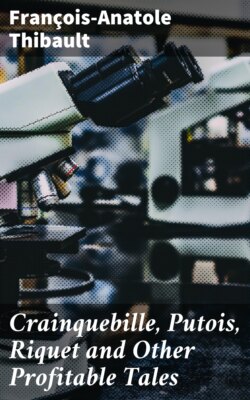Читать книгу Crainquebille, Putois, Riquet and Other Profitable Tales - François-Anatole Thibault - Страница 7
На сайте Литреса книга снята с продажи.
THE FINAL RESULT
ОглавлениеTable of Contents
OVERTY came, black poverty. The old costermonger who used to come back from the Faubourg Montmartre with a bag full of five-franc pieces, had not a single coin now. Winter came. Driven out of his garret, he slept under the carts in a shed. It had been raining for days; the gutters were overflowing, and the shed was flooded.
Crouching in his barrow, over the pestilent water, in the company of spiders, rats and half-starved cats, he was meditating in the gloom. Having eaten nothing all day and no longer having the chestnut-seller's sacks for a covering, he recalled the fortnight when the Government had provided him with food and clothing. He envied the prisoners' fate. They suffer neither cold nor hunger, and an idea occurred him:
"Since I know the trick why don't I use it?"
He rose and went out into the street. It was a little past eleven. The night was dark and chill. A drizzling mist was falling, colder and more penetrating than rain. The few passers-by crept along under cover of the houses.
Crainquebille went past the Church of Saint-Eustache and turned into the Rue Montmartre. It was deserted. A guardian of the peace stood on the pavement, by the apse of the church. He was under a gas-lamp, and all around fell a fine rain looking reddish in the gaslight. It fell on to the policeman's hood. He looked chilled to the bone; but, either because he preferred to be in the light or because he was tired of walking he stayed under the lamp, and perhaps it seemed to him a friend, a companion. In the loneliness of the night the flickering flame was his only entertainment. In his immobility he appeared hardly human. The reflection of his boots on the wet pavement, which looked like a lake, prolonged him downwards and gave him from a distance the air of some amphibious monster half out of water. Observed more closely he had at once a monkish and a military appearance. The coarse features of his countenance, magnified under the shadow of his hood, were sad and placid. He wore a thick moustache, short and grey. He was an old copper, a man of some two-score years. Crainquebille went up to him softly, and in a weak hesitating voice, said: "Mort aux vaches!"
Then he awaited the result of those sacred words. But nothing came of them. The constable remained motionless and silent, with his arms folded under his short cloak. His eyes were wide open; they glistened in the darkness and regarded Crainquebille with sadness, vigilance and scorn.
Crainquebille, astonished, but still resolute, muttered:
"Mort aux vaches! I tell you."
There was a long silence in the chill darkness and the falling of the fine penetrating rain. At last the constable spoke:
"Such things are not said.… For sure and for certain they are not said. At your age you ought to know better. Pass on."
"Why don't you arrest me?" asked Crainquebille.
The constable shook his head beneath his dripping hood:
"If we were to take up all the addle-pates who say what they oughtn't to, we should have our work cut out!… And what would be the use of it?"
Overcome by such magnanimous disdain, Crainquebille remained for some time stolid and silent, with his feet in the gutter. Before going, he tried to explain:
"I didn't mean to say: Mort aux vaches! to you. It was not for you more than for another. It was only an idea."
The constable replied sternly but kindly:
"Whether an idea or anything else it ought not to be said, because when a man does his duty and endures much, he ought not to be insulted with idle words.… I tell you again to pass on."
Crainquebille, with head bent and arms hanging limp, plunged into the rain and the darkness.
1 ↑ It is impossible to translate this expression. As explained on p. 21, it means “down with spies," the word spies being used to indicate the police.
